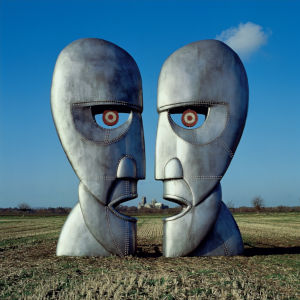(#498: 9 April 1994, 4 weeks)
Track listing: Cluster One/What Do You Want From Me/Poles Apart/Marooned/A Great Day For Freedom/Wearing The Inside Out/Take It Back/Coming Back To Life/Keep Talking/Lost For Words/High Hopes
The paradox of late-period Pink Floyd lies in how they deal with the grumpy contrarian who, unfortunately for them, wrote most of their best songs. One can speak about maturing (“Coming Back To Life”), or coming to agreeable terms with one’s early life (“High Hopes”), or how pleasant it is having your girlfriend rather than your worst enemy as co-songwriter. And then one is faced with song after vituperative song – “What Do You Want From Me,” “Poles Apart,” “Lost For Words,” even “A Great Day For Freedom,” with its reference to “On the day The Wall came down” – the conservative sheen of which does not particularly conceal a smouldering detestation of one person and their outlook.
If A Momentary Lapse Of Reason, with its momentary lapse of smelly sexism (“One Slip”), was essentially David Gilmour plus session musicians, The Division Bell makes more of an effort to sound like the work of a group, or at least 75% of a group – it is noticeable that the record’s most individualistic moment, not to mention almost its only humorous moment (hang on until the end of the CD for the other minor one), comes with “Wearing The Inside Out,” co-written (with Anthony Moore) and lead-sung by Richard Wright. Nick Mason’s drums are generally mixed so far back that he might as well as faxed them in.
I am also fully aware of the grave signifier of Gilmour’s booming, swaying voice (particularly throughout “Coming Back To Life”) and all the history it implies. Yet this is terribly timid, conciliatory music; there are the obligatory shortwave logjams at album’s beginning and another random media scan halfway through “Poles Apart,” as the song pauses to take stock, but even after three straight listens yesterday I found myself forgetting how the tunes went while they were still playing.
Concessions to a particularly arid modernity are ceaselessly proffered by the record. “Take It Back” sounds like 1987 U2, “Coming Back To Life” like 1985 Dire Straits. While I am sure how taken the seventeen-year-old Chris Martin must have been by “Keep Talking,” Hawking’s talking on it is sampled from the British Telecom television commercial, rather than getting in the man himself. And what does it say, this great treatise on the importance of continued communication, when you spend most of it going nyah underpants at the stilled Waters?
Perhaps the album’s profoundest truth comes on “Marooned,” a collage of three or four instrumental jam sessions which goes nowhere elegantly but slowly, the title of which indicates how the band might have viewed itself sans the low-ranking Roger. Then again, The Division Bell fits in all too easily with the placid post-Unplugged pool of past noisy rebellions being brought to heel and tamed. The title was suggested by the late Douglas Adams. The album went double-platinum in Britain alone. It has to date sold about seven million copies worldwide. What price the river, floating out of “See Emily Play,” filtering through “High Hopes” and, ultimately, proving endless (entry #1028), when you end up as the Moody Blues?



